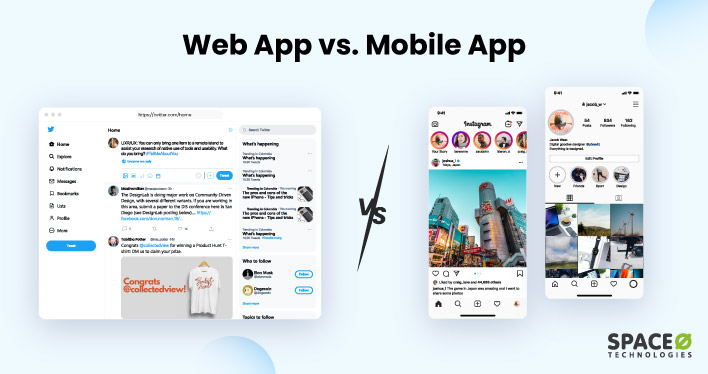- The key difference between a web app and a mobile app is that a web app runs through a web browser and requires an internet connection, while a mobile app is installed directly on a mobile device.
- Develop PWA as an alternate solution to leverage the strength of both mobile apps and web apps. It is because, PWA provides a seamless user experience across various devices and platforms, offer offline functionality, and integrate well with devices.
Key Takeaways
Are you finding it difficult to choose between mobile applications or web applications? – If the answer is yes, you’ve come to the correct place.
In this blog, we aim to provide you with a comprehensive comparison of a web app vs mobile app, helping you make an informed choice. This blog provides you with valuable insights and practical advice on developing a successful web application.
Let’s start our journey by understanding the definitions.
Table of Contents
What is a Web App?
Web app is a software application that runs on the web browser and is accessed over the internet is known as a web app. Web apps are used on all devices that include desktops, mobile phones, tablets, and laptops.
Web apps are accessed by the user through a web browser with an active internet connection. This means that they don’t need to be downloaded and installed on the user’s device, like traditional software applications. Instead, they are provided as a service over the internet.
A few examples of web apps include webmail websites like Yahoo, Gmail, eCommerce website like Amazon, and social media websites like Twitter.
If you are looking to build a web app, here is a comprehensive guide that describes the process to build a web app. From this guide you will know the 10-step process and cost to build a web app.
What is a Mobile App?
Mobile apps is a software that is specifically designed and developed to run on mobile devices. Such as smartphones, tablets, or wearables. Moreover, mobile applications are used for a variety of purposes including communication, entertainment, productivity, information, and shopping.
A few examples of popular native mobile apps include the social media app Whatsapp, Twitter, and Instagram, entertainment mobile applications like Netflix, TikTok, and Spotify, and shopping apps like Amazon, eBay, and Walmart.
Now, let us understand the differences between web apps and mobile apps by comparing the key parameters.
8 Key Differences Between Web App and Mobile App
The below-mentioned table will help you to find the key difference between web and mobile apps with a few examples and their features.
| Web Apps vs Mobile Apps | |||
|---|---|---|---|
| Sr. No | Parameters | Web Apps | Mobile Apps |
| 1 | Platform | Web apps are accessible on multiple platforms, making them cross-platform applications. | Mobile apps are created specifically for particular mobile platforms, such as iOS or Android, and are tailored to the functions and aesthetics of those platforms. iOS apps, for example, are designed and developed specifically for Apple devices. |
| 2 | Technologies | The commonly used technologies to develop or web apps built on HTML, CSS, JavaScript, PHP, Ruby on Rails (ROR), and Node.js | Mobile apps are developed using platform-specific programming languages such as Java or Swift, along with specific standard software development kits (SDKs). | 3 | Installation | Web apps don’t need to be downloaded or installed. They are easily accessible to users using the web browsers. | Mobile apps are available as icons on the user’s mobile devices and must be downloaded and installed through Google Play Store and App Store. | 4 | Access | Web apps are accessed through a web browser by entering a URL or clicking on a link. | Mobile apps functions are accessed by tapping on their respective app icons on the user’s device, providing a dedicated and streamlined user experience. | 5 | Offline Access | Since they are entirely dependent on internet browsers, web apps often only offer a very limited offline capability. | Complete offline access can be provided via mobile apps, enabling users to access specific features and material even when they are not connected to the internet. | 6 | Distribution | Web apps can be accessed directly through a URL or link and do not need to be distributed through stores. | Mobile apps are distributed through the Play Store or App Store, which offer centralized platforms for users to discover, download, and update apps. | 7 | Updates | Web apps can be updated instantly by developers, without requiring any action from the user. | Updates for mobile apps are pushed by app developers through app stores, where users need to download and update them on their devices. | 8 | Development Cost | Web apps are generally more cost-effective to develop compared to a native mobile app due to factors such as development approach and single codebase. | Mobile app development might cost higher than web apps depending upon the factor and requirements of an application. |
Have a Mobile App Idea?
With a free consultation session, discuss your idea, get it validated, and start developing apps with an experienced development team.

Nevertheless, before embarking on any specific platform it is crucial to go through their pros and cons to make the right decision. By doing this, you can make sure that you select the platform that best suits your requirements and make your app development aim satisfied.
What are the Advantages and Limitations of Web Applications?
In this section, we will discuss the advantages and limitations that will help you to identify the right differences between web applications and mobile applications.
The key advantage and limitations of web applications are as follows:
| Pros of Web App | Cons of Web App |
|---|---|
|
|
While understanding web apps, you may have doubts about whether to opt for a website or web app, To clear your confusion, explore the blog – web app vs website to know the comparisons in detail. From this blog, you will get an in-depth idea of choosing a website or web app. Since we have understood the pros and cons of web applications, let’s quickly go through the scenarios when building web apps is a suitable choice.
When to Build a Web Application?
Building a web application can be a strategic decision for your business in several scenarios. Consider the following situations:
- To reach a wide audience across different devices, platforms, and operating systems.
- When cost-effectiveness is a priority compared to developing native mobile applications.
- When quick deployment and accessibility are important, without the need for users to download and install anything.
- When flexibility in updates and maintenance is desired, with the ability to make server-side updates.
- When the focus is on delivering content, information, or services to users efficiently.
If you are planning to build a web app and searching for ideas then go through our post on best web application ideas. These ideas will help you learn about the possible ways one can generate profits as well as solve societal issues through web applications.
Want to Develop a Web App?
Let’s get in touch. We have experienced developers who build custom web app solutions as per your requirements.
Now let’s go through the advantages and limitations of a mobile application.
What are the Advantages and Limitations of Mobile Apps?
This section includes the advantages and limitations of a mobile app that will make decision-making easy to associate with mobile applications.
| Pros of Mobile App | Cons of Mobile App |
|---|---|
|
|
Since we have understood the pros and cons of mobile applications, let’s quickly go through the scenarios on when you can build mobile applications.
When to Build a Mobile Application?
Developing a mobile app is a suitable choice in various scenarios:
- To provide a more immersive user experience by utilizing the native capabilities of mobile devices, such as popular mobile apps that send push notifications, access the camera, utilize GPS, and enable intuitive gestures.
- To increase user engagement through personalized interactions, intuitive design, and notifications, resulting in higher satisfaction and loyalty.
- To offer offline functionality, enabling users to access certain features and content even without a connection, ensuring uninterrupted usage.
- To generate quick revenue through monetization options like in-app purchases, subscriptions, and targeted advertisements, leveraging app stores’ payment systems.
If you want the advantage of both the platforms web apps and mobile apps, you can even build a combination that is PWAs.
Progressive Web Apps – An Alternate Solution
Progressive Web Apps (PWAs) offer a hybrid app solution that combines the best features of both mobile apps and web apps. PWAs are installable on a user’s mobile device, can be launched from the home screen, and can even work offline. Such an agile feature of PWA bridges the gap between web apps and native mobile apps making them a popular choice for hybrid mobile apps.
A few examples of PWAs are Forbes, Alibaba, Starbucks, and Telegram. As PWA offers Android apps and Windows Phone apps, experienced users find it easy to use and navigate PWAs. They can be easily updated and maintained, reach a wider audience through search engines and URLs, and offer features such as offline access and notifications. PWAs provide a responsive design, work across platforms, and offer improved performance compared to traditional web apps.
However, it’s important to note that developing PWAs, as hybrid mobile apps, is comparatively more expensive than traditional web apps. Additionally, PWAs cannot access all of the same device features as native apps for example PWAs cannot access the camera, Bluetooth, and GPS.
Progressive web applications are a good choice if you want your audience to experience native and web apps augment within one app. Get in touch with our progressive web applications development team and know more about it.
Still have doubts about a mobile application or web application, let’s understand faqs in the next section.
Frequently Asked Questions About Mobile App vs Web App
How much time does it take to develop a web app from scratch?
The development time for a web app from scratch can vary depending on factors such as app complexity, desired features, design requirements, development resources, and experience of the development team. Generally, simpler web apps take 2 – 4 months, while more complex ones may take 4 – 12 months or more.
Are progressive web apps better than web apps and mobile apps?
Progressive web apps offer a set of advantages as compared to traditional web apps and mobile apps, but whether they are “better” depends upon specific requirements and context. PWAs are costlier to develop than web apps however, if you are looking to provide an immersive user experience to your customer then PWA is a better choice.
What are the distinctions between native and hybrid apps?
Native applications are created especially for a given platform, like iOS or Android. While hybrid apps, on the other hand, are built using web technologies, such as HTML, CSS, and JavaScript.
Are web apps available in the Google Play Store?
Web apps are not available on Apple App Store or Google Play Store as it is accessible through web browser, hence app users do not need to download any web app from the app store. By just providing the hyperlink on any browser users can access web apps.
Can a web application be converted into a mobile app?
Of course, web apps can easily be converted into native mobile apps. This can be achieved through a process called hybrid app development where web technologies (HTML, CSS, JavaScript) are wrapped in a native container to create a mobile app. However, it’s important to note that the resulting app may not perform as efficiently as a natively developed mobile app.
Let us Help You Choose the Right App Development Platform for Your Specific Needs
Choosing the right platform for app development is the pathway to online business success. Hence choosing the right platform for app development becomes important. In this blog, we have provided comprehensive differences between web and mobile applications that include definitions, pros and cons, examples of web applications and mobile applications, and comparing the key difference between mobile and web applications.
However, if you still find it difficult or have questions about choosing the best from the mobile and web apps then you can get in touch with our experts in mobile app and web app development. Our team of experts will help you to solve your mobile and web app dilemma with seamless and professional-grade solutions.



